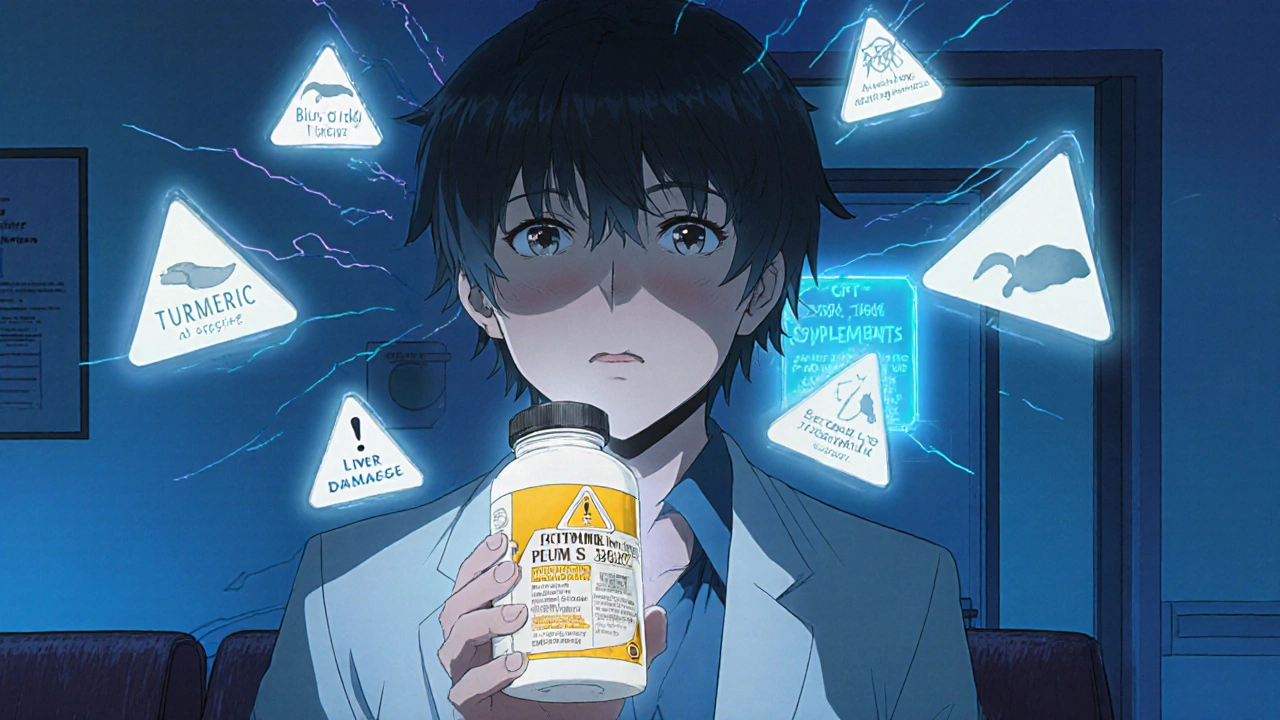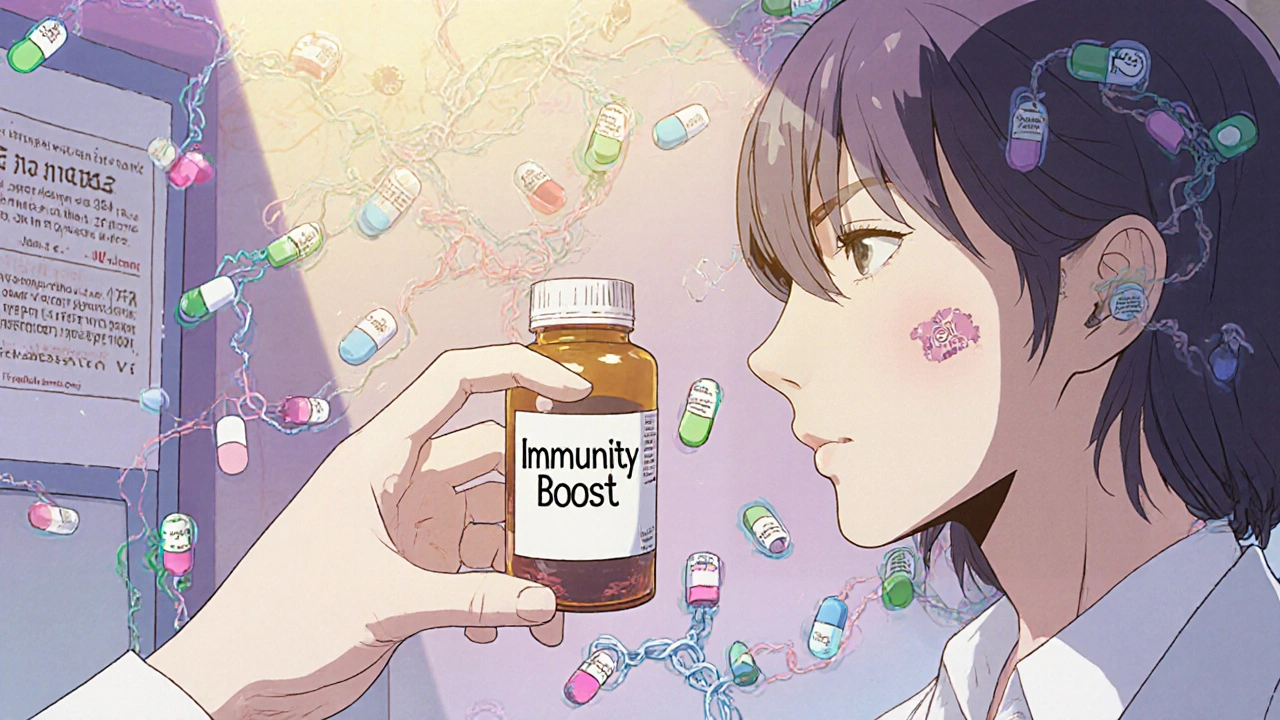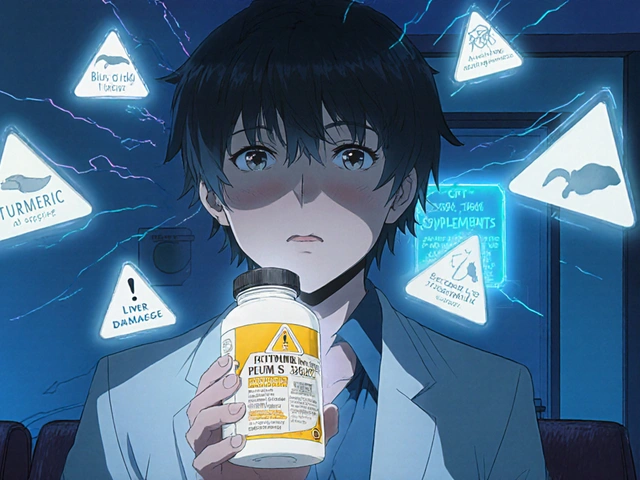Why You Must Tell Your Doctor About Supplements and Herbal Remedies

It’s 2025. You’re taking turmeric for your knees, magnesium for sleep, and St. John’s wort for low mood. You think these are harmless, natural, and safe-so why tell your doctor? Maybe you’ve never been asked. Maybe you assume they don’t care. But here’s the truth: supplements aren’t harmless. And if you don’t tell your provider, you could be putting your health at real risk.
Most People Don’t Tell Their Doctors-And That’s Dangerous
A 2023 study found that only about one in three people who take herbal supplements or vitamins tell their doctor. Even among people with chronic conditions like diabetes, heart disease, or high blood pressure-those who are on multiple prescriptions-the rate is barely over 50%. That means nearly half of the people taking something that can change how their meds work are doing it in the dark. Why? Because most patients believe supplements are “just natural.” They think if it’s from a plant, it can’t hurt. But turmeric can thin your blood. Garlic pills can interfere with HIV meds. Kava can damage your liver. And St. John’s wort? It can make your birth control useless, lower the effect of your antidepressants, or even cause serotonin syndrome when mixed with SSRIs. Your doctor isn’t judging you. They’re trying to keep you safe.Supplements Aren’t Regulated Like Medicines
Here’s something most people don’t know: the FDA doesn’t approve supplements before they hit the shelf. Under the Dietary Supplement Health and Education Act (DSHEA) from 1994, companies can sell anything they want as long as they don’t claim it cures disease. That means a bottle labeled “Immunity Boost” might contain 10% of what it claims-or it might have a hidden drug ingredient that’s banned in other countries. Labels say “Not evaluated by the FDA.” That’s not a marketing line-it’s a legal requirement. But most people skip right past it. The result? You’re taking something with unknown strength, unknown purity, and unknown interactions. Your provider needs to know exactly what’s in what you’re taking. That’s why bringing the actual bottle to your appointment isn’t just helpful-it’s critical. Labels change. Ingredients shift. And without seeing the product, your doctor is guessing.Herbs Can Act Like Prescription Drugs
Many herbal remedies work the same way as pharmaceuticals. They bind to receptors, affect liver enzymes, or alter how your body absorbs or breaks down other substances. Take St. John’s wort again. It boosts a liver enzyme called CYP3A4. That enzyme breaks down over 50% of all prescription drugs. So if you’re on blood thinners like warfarin, antidepressants like sertraline, or even birth control pills-St. John’s wort can make them stop working. One study showed women on the pill who took this herb had a 30% higher chance of unintended pregnancy. Ginkgo biloba? It can increase bleeding risk during surgery. Ginger? Can lower blood sugar too much if you’re on metformin. Licorice root? Raises blood pressure and messes with potassium levels. These aren’t theoretical risks. They’re documented. Real people have had strokes, liver failure, and hospitalizations because their provider didn’t know they were taking something “natural.”
Your Doctor Might Not Ask-So You Have to Speak Up
Here’s the uncomfortable truth: most doctors don’t ask about supplements. A 2021 survey found that only 27% of physicians felt confident enough to talk about them. Why? Because medical schools barely teach it. The average appointment is 15 minutes. They’re focused on your blood pressure, your cholesterol, your new pain. But that doesn’t mean you shouldn’t bring it up. In fact, research shows that when doctors ask directly-“What vitamins, herbs, or supplements are you taking right now?”-disclosure rates jump from 33% to 78%. Don’t wait to be asked. Say it early. At the start of your visit. Say: “I’m taking a few supplements. I’d like to make sure they’re okay with my meds.” That simple sentence changes everything.What to Say and How to Say It
You don’t need to be a scientist. Just be clear.- “I take magnesium every night for sleep.”
- “I’ve been using ashwagandha for stress for six months.”
- “I got this turmeric capsule from the health food store-it’s called ‘Joint Ease’.”

What Happens When You Do Disclose?
When you tell your provider, three things usually happen:- They check for interactions with your current meds.
- They might suggest a safer alternative.
- They might tell you to stop something entirely.
The Bigger Picture: Why This Matters for Everyone
This isn’t just about you. It’s about the system. In the U.S., the supplement industry made over $55 billion in 2022. There are 85,000 products on the market. Most are sold without proof they work-and without proof they’re safe with other drugs. And yet, 67% of Medicare beneficiaries take at least one supplement. That’s millions of people on multiple medications, with aging livers and kidneys, quietly mixing things that could cause serious harm. The FDA is trying to catch up. They now list 172 ingredients with known safety concerns. Some states are requiring pharmacies to screen for supplement interactions. By 2026, electronic health records may include mandatory supplement fields. But none of that matters if you don’t speak up.Final Thought: You’re the Only One Who Can Protect Yourself
Your doctor can’t read your mind. They can’t see what’s in your medicine cabinet. They rely on you to tell them what you’re doing to your own body. Supplements aren’t the enemy. But silence is. Next time you walk into a clinic, don’t wait for them to ask. Say it first. Bring the bottle. Be honest. It’s not about being perfect. It’s about being safe.Because when it comes to your health, “natural” doesn’t mean “no risk.”


Look, I take ashwagandha, turmeric, and magnesium daily-my Ayurvedic grandma would roll in her grave if I didn’t. But I bring the bottles to every appointment, even if the doctor sighs. In India, we call this ‘desi wisdom’-but here? It’s called ‘potential ER visit.’
One time, my doctor caught that my turmeric pill had a hidden blood thinner. I thought it was just ‘extra strength.’ Turns out, it was a sneaky coumadin analog. Scary stuff.
Don’t let ‘natural’ fool you. My uncle took ginkgo before knee surgery-bled out in the OR. No one asked. No one knew. He’s fine now, but barely.
Bring the bottle. Take a photo. Write it down. Even if they don’t ask. Even if they roll their eyes. Your life isn’t a gamble.
And yes, I know the FDA doesn’t regulate it. But neither does the guy selling ‘magic mushrooms’ at the farmers’ market. That doesn’t make it safe.
My cousin’s mom died from liver failure because she took kava ‘for anxiety’ and never told her cardiologist. She thought it was ‘just tea.’
Stop being polite. Start being alive.
Let’s be real: 90% of people taking supplements are just chasing placebo effects while ignoring actual medical advice. You think magnesium helps sleep? Maybe. But you’re also ignoring sleep hygiene, circadian rhythm, and stress management. Supplements are a crutch for lazy self-care.
And the idea that ‘natural’ equals safe is the most dangerous myth in wellness culture. Poison ivy is natural. Ricin is natural. You’re not a pioneer-you’re a walking pharmacokinetic liability.
Also, St. John’s wort? It’s not ‘herbal Prozac.’ It’s a CYP3A4 inducer with a 30% failure rate on birth control. That’s not ‘natural healing’-that’s a pregnancy waiting to happen.
And don’t get me started on ‘immune boosters.’ Your immune system doesn’t need boosting. It needs balance. You’re not a video game character.
Hey, I get it-you’re trying to be proactive. But here’s the thing: most of these supplements are just glorified sugar pills with a fancy label. I’ve seen people spend $200 a month on ‘stress relief’ powders while skipping therapy.
And let’s not pretend your doctor doesn’t know what you’re taking. They see it in your labs. They see the elevated liver enzymes. They see the weird drug interactions.
But they won’t say anything unless you bring it up. Because they’re busy. Because they’re tired. Because they’ve seen this 50 times this week.
So yeah, bring the bottle. But also ask: ‘Is this actually helping me?’ Not ‘Is this safe?’-because safety is the bare minimum.
And if your doctor doesn’t know about CYP3A4? Find a new one. Or at least Google it before you swallow another capsule.
Just brought my supplement drawer to my last appointment. 😅 Bottle of ashwagandha, turmeric, zinc, vitamin D3, and a weird ‘gut reset’ powder I got from Amazon. Doctor didn’t blink. Just said, ‘Cool. Let’s check your vitamin D level and stop the gut thing-it’s full of laxatives.’
Turns out, I was taking 10,000 IU of D3 daily. My level was 120. Normal is 30–80. I was basically poisoning myself with ‘health.’
She also said my turmeric was fine, but the brand had heavy metals. So now I buy third-party tested stuff. $40 a month, but I sleep better knowing I’m not ingesting lead.
TL;DR: Don’t be shy. Bring the stuff. Ask the dumb questions. Your doctor’s not judging. They’re just glad you showed up.
And yes, I cried a little when she told me to stop the ‘gut reset.’ But I’m alive. 🙏
Hey, I used to think supplements were just ‘extras’-until my mom had a stroke because she was taking ginkgo with her blood thinner. No one asked. No one knew. She’s okay now, but it was terrifying.
Now I tell every doctor, every nurse, every pharmacist: ‘I take magnesium, omega-3, and ashwagandha.’ Even if they don’t ask. Even if they’re rushing.
It’s not about being perfect. It’s about being safe. And honestly? Most doctors are so relieved when you bring it up. They’re not trained for this stuff. But they want to help.
Bring the bottle. Write it down. Say it loud. You’re not annoying-you’re saving your life.
And if they say ‘it’s fine’? Ask again. And again. You’re the only one who knows what’s in your body.
What’s next? Are we gonna start asking our doctors if we’re breathing oxygen? Everything’s natural. Water is natural. Air is natural. But you don’t see people taking ‘oxygen supplements’ and acting like they’re curing cancer.
This whole ‘natural = safe’ thing is a scam. Big Pharma hates it because it’s cheaper than pills. But that doesn’t make it better.
And don’t even get me started on ‘herbal remedies.’ You think your grandma’s turmeric tea is magic? It’s just a spice. Your body doesn’t need it. You just like the taste.
Stop being gullible. Stop wasting money. Stop pretending you’re a wellness warrior. Just take your meds and go to the gym.
Bro, I live in India. We’ve been using turmeric, neem, and ashwagandha for 5000 years. But we also know when to stop. My dad had high BP. He took garlic pills. Then he got dizzy. We went to doctor. They said ‘stop garlic, your BP is too low.’
It’s not about being scared. It’s about being smart.
Bring the bottle. Say the name. Even if you’re shy. Your doctor will thank you. They’ve seen people die because no one spoke up.
It’s not magic. It’s just common sense. 🙏
As someone who works in pharmacogenomics, I can tell you: the CYP450 system is a minefield. St. John’s wort? CYP3A4 and CYP2C9 inducer. That’s not a footnote-it’s a full-blown drug interaction waiting to detonate.
And most patients don’t know that ‘standard dose’ on a supplement label is meaningless. The pill you bought last month? Might be 2x stronger than the one you bought last year. No one tested it. No one regulated it.
Bringing the bottle isn’t ‘extra’-it’s the only way your provider can give you accurate advice.
And yes, I’ve seen people with transplant rejection because they took echinacea. It’s not theoretical. It’s in the journals.
You people are pathetic. You think you’re ‘taking control’ of your health by swallowing random powders from a guy on Instagram? You’re not empowered-you’re delusional.
St. John’s wort? It’s not ‘natural antidepressant.’ It’s a serotonin modulator that can kill you if you’re on SSRIs. You’re not ‘healing’-you’re playing Russian roulette with your brain chemistry.
And you’re not ‘being honest’ with your doctor. You’re just checking a box. You don’t even know what’s in those pills.
Get a therapist. Get sleep. Eat vegetables. Stop buying snake oil.
And if you think your ‘wellness routine’ makes you better than someone on meds? You’re not just wrong. You’re dangerous.
I took 12 different supplements last year. I thought I was a biohacker. I had a spreadsheet. I had a journal. I had a whole ritual. Then I got pancreatitis.
Turns out, the ‘digestive enzyme’ I was taking? Contained a banned stimulant. The ‘immune booster’? Had heavy metals. The ‘sleep blend’? Had melatonin and diphenhydramine in a 5:1 ratio.
My doctor said, ‘You’re lucky you didn’t die.’
Now I take one thing: vitamin D. And I only take it after I show the bottle to my GP.
Stop pretending you’re a scientist. You’re not. You’re just trying to feel better.
And if you’re not willing to bring the bottle? Then don’t take it.
I used to think supplements were harmless until I got my period stopped because I took too much magnesium. I didn’t even know that was a thing. My OB said, ‘You’re lucky you didn’t have a clot.’
Now I bring my stuff to every appointment. Even if I feel dumb. Even if they’re busy. Even if they say ‘it’s fine.’ I say ‘but what about this one?’
And guess what? My doctor started asking me first. Now she says I’m her ‘best patient.’
It’s not about being perfect. It’s about being brave.
You got this. 💪❤️
It is an undeniable fact that the contemporary pharmacological paradigm, as dictated by the Western medical establishment, exhibits a profound epistemological deficiency in its understanding of phytochemical interactions. The DSHEA framework, enacted in 1994, constitutes not merely a regulatory lacuna, but a systemic abdication of the state’s fiduciary duty toward the citizenry’s biological integrity.
One is compelled to observe, with mounting consternation, that the populace, lulled by the siren song of ‘natural’ and ‘holistic’ rhetoric, willingly surrenders their autonomy to the capricious whims of unregulated nutraceutical conglomerates.
The CYP3A4 enzyme induction by Hypericum perforatum is not anecdotal-it is a biochemical inevitability. To neglect disclosure is not negligence; it is metaphysical hubris.
One must, therefore, invoke the imperative of epistemic humility: bring the bottle. Document the dose. Submit to the algorithm of clinical reason.
For in the absence of such vigilance, the body becomes a battlefield-and the patient, an unwitting combatant.
My grandma took garlic pills for 20 years. Never told her doctor. Got a nosebleed during a cold and ended up in the ER. Turns out, she was on blood thinners. They didn’t know.
Now she brings her supplements to every visit. Even if she forgets, she texts me and I send the pic.
It’s not hard. Just do it.
The regulatory vacuum created by DSHEA permits the commercialization of substances with undefined pharmacokinetic profiles. Clinical documentation of herb-drug interactions remains fragmented due to lack of standardized reporting. The burden of disclosure rests disproportionately upon the patient, whose medical literacy is often insufficient to interpret label claims or assess potential risks. This constitutes a systemic failure in patient safety infrastructure.
It is therefore imperative that clinicians adopt structured supplement histories as standard of care. Until then, patients must act as their own pharmacovigilance agents.
Bring the bottle. Record the batch number. Note the manufacturer. Document the dose. Preserve the label.
These are not suggestions. They are minimal prerequisites for autonomous medical decision-making.
Here’s the truth: your doctor doesn’t know jack about supplements. I asked mine about my ashwagandha and she said, ‘Oh, that’s the one that helps with stress, right?’ I almost laughed in her face.
So I brought the bottle. Showed her the label. She Googled it right there. Then she said, ‘Whoa. This interacts with your blood pressure med. Stop it.’
That’s right. She didn’t know. And I didn’t either.
So here’s my new rule: if I’m taking it, I show it. No shame. No fear. No ‘but it’s just a herb.’
My life isn’t a TikTok trend. It’s my body. And I’m done letting strangers on the internet decide what goes in it.
Bring the bottle. Be loud. Be proud. You’re not weird-you’re wise.